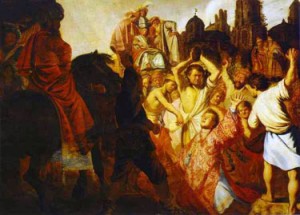 [1]My dictionary defines apologetics as a “systematic and logical defense of Christianity against its detractors and unbelievers” In 1 Peter 3.15, Christians are told to be ready to give a reason (apologia) for their hope in Christ.
[1]My dictionary defines apologetics as a “systematic and logical defense of Christianity against its detractors and unbelievers” In 1 Peter 3.15, Christians are told to be ready to give a reason (apologia) for their hope in Christ.
Apologetics can draw people to Christ as we read in the Book of Acts with Saint Peter on the day of Pentecost. Peter’s sermon was a classic example of apologetics and drew 3,000 people to faith in Christ. Saint Paul’s witness in Athens was another example of apologetics at work. It is documented in Acts 17.17-34.
But, apologetics does not always convert people. They must have an open mind and a seeking heart. The most brilliant defense of Christianity will not change the hearts of those who refuse to accept it. Look at the events leading up to the Martyrdom of Stephen. We read in the 6th Chapter of Acts that he was “a man full of faith and the Holy Spirit” (verse 5). People who were opposed to his witness for Christ were not able to resist “the wisdom and the Spirit by which he spoke.”(verse. 10) How did they respond? The shocking answer is found in Chapter 7: They killed Stephen.
Stephen’s words cut deep into the hearts of an unreceptive group of religious leaders in Jerusalem. Anger toward Stephen by the crowd grew to a climax and they turned into a mob. In what must have been a terrifying moment for Stephen, God gave him a serene vision of heaven. Looking past the terror of his impending death, Stephen saw to the Glory of Jesus waiting for him. He said, “Behold, I see the heavens opened and the Son of Man standing at the right hand of God.” (Throughout the centuries, this has been the hope that dissolves fear for believers who die in Christ.)
Those words of Stephen the Martyr were too much for his accusers. They rushed and ceased him, threw him out of the city and stoned him. As he was dying Stephen was heard praying “Lord Jesus, receive my spirit.” The stones continued to rain down on him. He fell to his knees and uttered his last words: “Lord, do not hold this sin against them.”
What happened to the murderous crowd as a result of Stephen’s witness for Christ and his brutal death at their hands? We don’t know what happened to most of them but one was a man named Saul ? a terrible persecutor of Christians. He later had a dramatic encounter with Christ on the road to Damascus. He became the great Saint Paul and went to his own death after years of witness for Christ and defending faith in Him (apologia).
Other examples of ancient apologetics include a defense of Christianity (Apologia [2]) by Saint Quadratus of Athens to the Roman Emperor Hadrian in A.D. 130. Justin Martyr left two apologiae. In his book City of God [2], Saint Augustine defended Christianity against pagan allegations that Christians were responsible for the fall of Rome. Saint Thomas Aquinas defined apologetics as making known the truth of the Catholic Church.
In an era that is increasingly hostile to Christianity – such as the one in which increasing in North America – it is important that followers of Christ be ready to defend the truth of the Christian faith and be prepared to give a reason for the hope that is within them. Don’t expect everybody to accept what you tell them but learn to systematically and logically defend your faith.
Always be prepared to share your faith in Christ at the right opportunity. You never know the impact your words and example will have on people. Your witness may not be the final link in the chain of another person’s journey to faith in Christ but make sure you’re not the missing link.
Like Stephen, there is a privilege in being given an opportunity to witness and glorify God in the face of great adversity. In some parts of the world that can mean death. Boldly express confidence in the reality that we will spend eternity with God, through faith in Jesus Christ, can be a powerful opportunity to witness to skeptics and unbelievers.
Personally, I have found more opportunities to witness for the hope
within me since becoming disabled and wheelchair-dependent than when I was healthy and able-bodied. It seems contradictory to a generation of people focused on youth and health.
My circumstances allow me opportunities to speak of faith that transcends physical limitations and focuses on eternal matters.
Use whatever circumstances you find yourself in to defend the Christian hope within you.